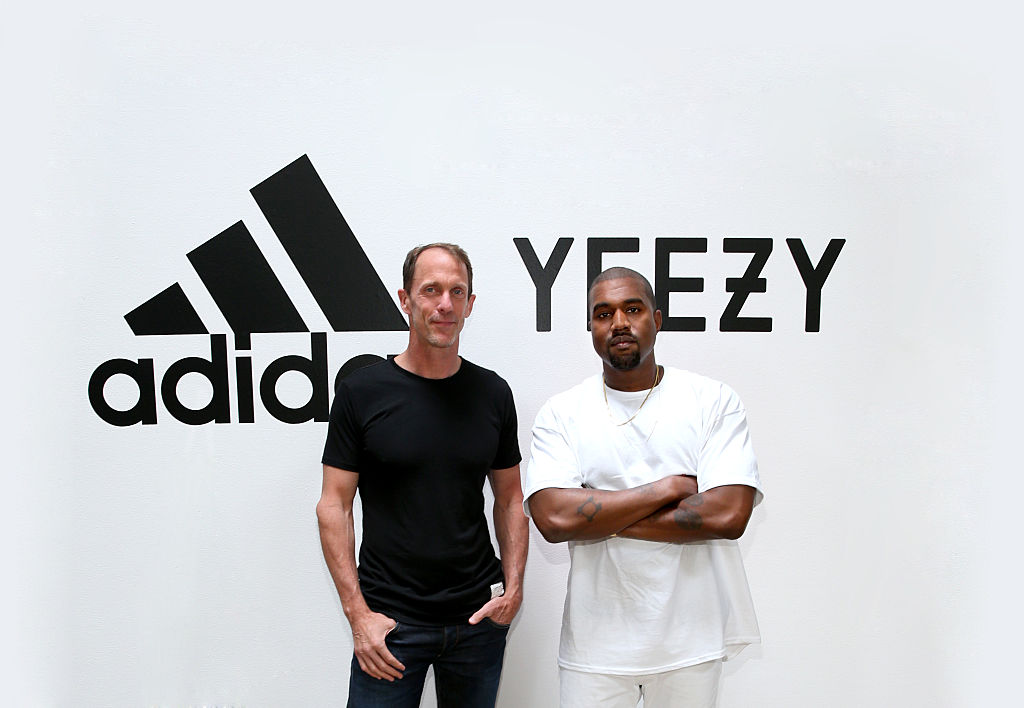
The news earlier this week that Adidas had become the latest company to end a product relationship with Ye, the artist formerly known as Kanye West, was neither surprising nor unexpected. Pressure was mounting in the wake of Ye’s conspiratorial antisemitic remarks, and the walls were closing in on him as more and more celebrities and other public figures spoke out.
But just as companies lined up to end their partnerships with Ye, extremists were embracing him. White supremacists were praising him and raising their arms in Nazi salutes. Faced with this pressure, the Adidas decision should have been inevitable. And yet, the company internally wrestled with this for nearly two weeks, even as Ye doubled down on his hateful words.
Even in the face of direct taunts—Ye told a podcaster “I can say antisemitic s*** and Adidas can’t drop me”—the German company’s leadership seemed unmoved. For a company whose founders were Nazis, who supported the Hitler Youth movement and signed letters “Heil Hitler,” their silence was deafening.
Ultimately, Adidas did the right thing and got out of the business of bigotry. They dropped Ye. But their failure to take more immediate action in the face of Ye’s unrepentant antisemitism raises new questions about corporate responsibility in the face of hate. These questions will continue to have larger repercussions for corporate America, especially as even more massive social media brands like Facebook, Twitter, Instagram, and YouTube grapple with how to effectively counter the rising antisemitism and harassment on their own platforms.
What role do large companies play in countering hate? How responsible are companies for the hate their brand ambassadors, partners, employees, or—in the case of social media companies—even their users espouse? As head of ADL, one of the oldest organizations fighting antisemitism and all forms of hate in the U.S., these are questions we tackle every day. In the case of Adidas, the answer was clear, which is why I engaged in tough conversations with Adidas executives, institutional investors and shareholders, and many others over the past two weeks, to get them to take meaningful action.
All of these questions matter deeply. We can’t end hate if we overlook it. And although no act of hate should go unchecked, the damage done by Ye’s unapologetic antisemitism is immeasurable.
Ye is no run-of-the-mill misguided celebrity. He’s on another level completely. Ye is one of the most well-known entertainers in the world. He’s a celebrity with hundreds of millions of fans—more than 31 million fans on Twitter alone and one of the most widely followed people on the platform. To put that in perspective, his Twitter following alone is more than double the entirety of the world Jewish population. And he’s more than a celebrity, he’s also a massive profit center for several consumer brands and a brand in and of himself.
So, when he wore a racist “White Lives Matter” shirt and then launched into anti-Jewish tirades, it was critical that everyone speak out and for brands to step up to do the right thing. After all, Ye was crystal clear in his antisemitism. The antisemitic conspiracy theories Ye unleashed have been around for millennia: Jewish power, Jewish control of Hollywood, Jewish greed, and Jewish responsibility for societal problems. These are all classic antisemitic tropes.
While it is bad enough to hear these ideas espoused in a closed white supremacist Facebook group, it is quite another to hear a celebrity pull the proverbial genie out of the bottle in front of millions.
What’s worse, Ye’s remarks came in an environment when antisemitic incidents have reached a historic, 40-year high. Four years ago to this day, a white supremacist who imbibed in similar hateful theories barged into the Tree of Life synagogue and murdered 11 worshippers. This attack and others are still fresh in people’s minds. The American Jewish community remains on edge and continues to live in significant fear and anxiety. We know all too well that when a celebrity of Ye’s stature takes to his platforms and claims Jews are out to get him, all it takes is one person to take those words to heart and to take action.
Which brings me back to Adidas’s initial silence in the face of Ye’s hate speech.
At a time when participation in organized religion is down significantly and when faith in our civic institutions and government is near historic lows, corporate brands are playing a more critical role as cultural trend-setters, societal advocates and role models. Today, many people define themselves through their connection to brands, whether it is a shoe company or social media platform. In short, brands matter.
And when household-name brands like Adidas say they uphold a set of values, such as opposition to racism, antisemitism and other forms of hate, they should be expected to abide by them. Which explains the reaction to Adidas when, at first, they apparently didn’t.
We will not win the battle for hearts and minds—or end antisemitism, racism, and hate—without corporate support. But it doesn’t stop there: Government leaders need to take more of a role too, both in denouncing hate even when it emanates from within their own ranks and in pushing forward policies that take aim at companies who allow hatred to spread.
It takes a whole-of-society approach. And if there’s anything to learn from the Adidas debacle, more and more Americans are looking to our corporate and civic leaders to step up.
More Must-Reads from TIME
- Cybersecurity Experts Are Sounding the Alarm on DOGE
- Meet the 2025 Women of the Year
- The Harsh Truth About Disability Inclusion
- Why Do More Young Adults Have Cancer?
- Colman Domingo Leads With Radical Love
- How to Get Better at Doing Things Alone
- Michelle Zauner Stares Down the Darkness
Contact us at letters@time.com